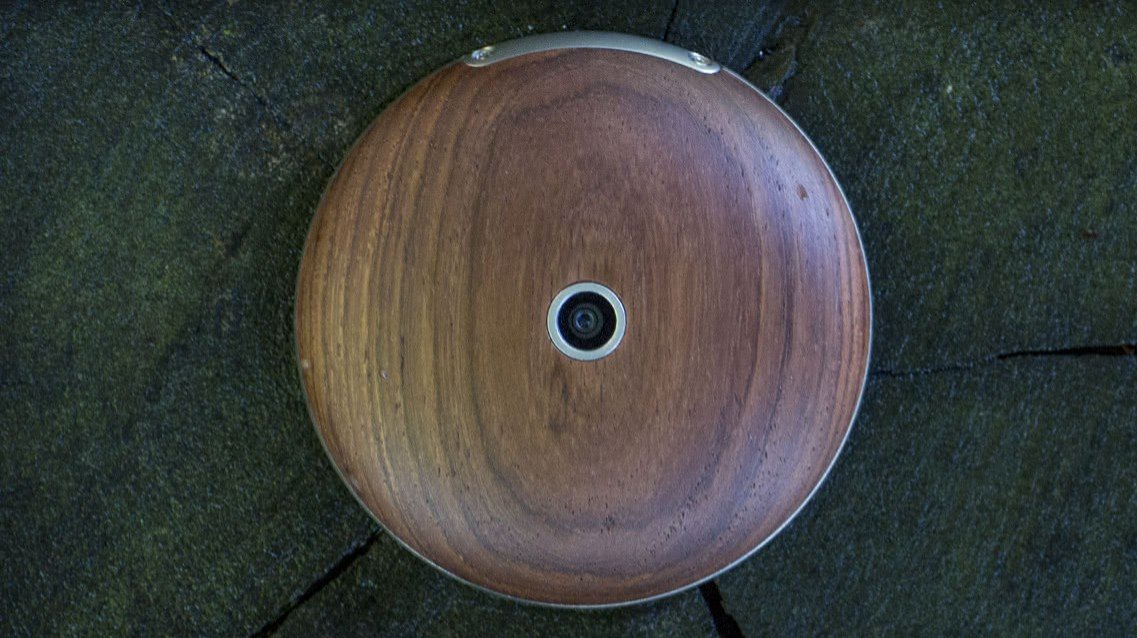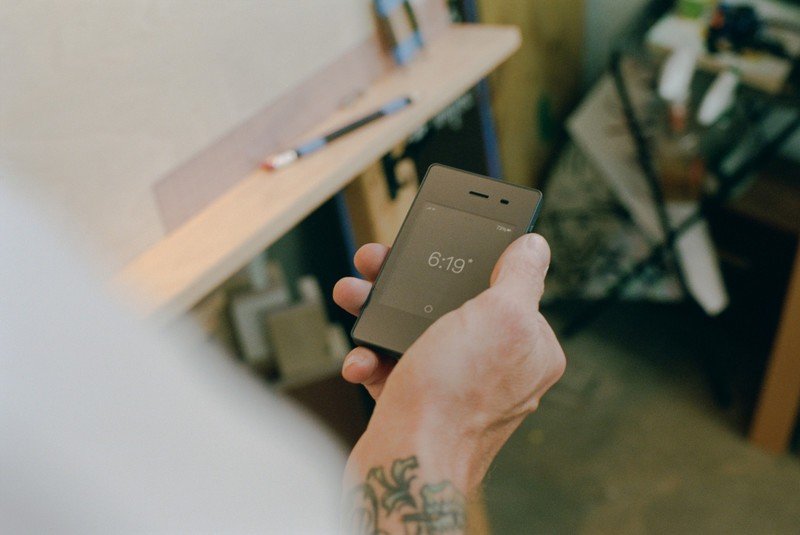This anti-smartphone raised over $250,000 in 2016, but backers are still waiting

Get the latest news from Android Central, your trusted companion in the world of Android
You are now subscribed
Your newsletter sign-up was successful
Breaking cover at MWC 2015, the Monohm Runcible was a round smartphone that bucked the norm. A smallish pocket watch-looking thing, Runcible offered to be something different from the large rectangular smartphones of the time. Making its way around the tech blogs, backed with a catchy name and an enthralling mission statement, it attracted attention from Indiegogo backers to the tune of $250,000 USD. It was a round smartphone that urged us to abjure notifications. It was the "anti-smartphone" that recalled the classic pocket watch. And, four years later, it has still not been released.
"Runcible is a new category of personal electronic which occupies a space between a traditional mobile phone and a wearable device," Monohm's website still says today. "Runcible is designed to help you create a more civilized relationship with your Digital Life. Runcible will never beep, alert, or otherwise interrupt you. The world-class connectivity we all came to expect in the smartphone era (LTE, WiFi, Bluetooth) is there on Runcible when you need it. For the rest of the time, you can keep your head up, your attention on the real world and real people around you, and maintain your sense of wonder about life."
To understand why the Runcible seemed so intriguing, we should reach back into the 2015 smartphone landscape when it burst onto the scene. Unlike nowadays with foldables and pseudo-foldables, the market was more staid and limited. Flagships seemed a samey endless glass sandwich parade, and concerns were rising about just how much a problem phone addiction was. The focus on digital wellbeing that seems table stakes now would only arrive in earnest a couple of years later. The market was ripe for so-called anti-smartphones.
The Runcible wasn't always an Android phone, nor was it the first 'anti-smartphone'
Runcible wasn't always an Android phone. The first Runcible made its conceptual debut as a Firefox OS project, perfect for a smartphone that billed itself as being different. After finding a chip that would run on the operating system, Mozilla killed off the operating system, and the project was thrown into disarray. With no operating system, Runcible had nothing to work with, so the decision was made to retool what they had and re-build it with Android.
"We came out of a long, possibly whiskey-fueled session with the idea that we should just do it anyway, that we should find a way to pursue this project in spite of having no operating system and no chip [...] I was initially a bit nervous to bet on Android because it's such a moving target, but way down low it actually isn't. It's pretty stable," Monhom's CEO Aubrey Anderson said to Android Authority.

"I can't make them move any faster without giving them a lot more money, and we can't do that"
Monohm built a version of Android known as BuniOS, which they said was so fast so as to "scream." As it was a fork (and had a round screen), it wasn't possible to include Google Play Store access, but this reinforced the Runcible's "anti-smartphone" concept, as it was meant to help focus you so that you'd get on with your life. It could still run Android apps downloaded from websites like APKMirror as well as web apps, but using the phone would have meant accepting functional concessions.
The Runcible reached its funding goal in July 2016, but then slowly hit the hard wall of reality. In a series of updates, Anderson warned backers of countless issues ranging from technical bottlenecks to supply issues with their hardware vendors, noting that it was "difficult, slow, fragile, risky, tedious work and we remain at the mercy of our hardware vendors to get things done. I can't make them move any faster without giving them a lot more money, and we can't do that, so we must go at the pace we can go."
Get the latest news from Android Central, your trusted companion in the world of Android
After fruitlessly trying to source funds from large corporate orders, In May 2019, he delivered a final update:
Our plan now is to return to what we're best at and what will bring in reliable revenue without derailing the hardware, which is technical consulting. We're going to take some completely unrelated work for a bit and chip away at the remaining overage costs until they're gone.We don't think we can realistically ask anything more of supporters other than continued patience. We're in discussions with past and new investment partners as well. We are open to any and all ideas about how to get unstuck.
And that's where the Runcible stands today. Stuck in a rut where the ambition of the creator couldn't quite match the reality of what was possible, a round peg in a square hole. We've reached out to Anderson for a comment on this article, but have yet to hear back at the time of writing.

In the world anti-smartphones, circular or otherwise, Runcible isn't the first one, and it likely won't be the last. There's the Light Phone, another "anti-smartphone" project that found some success with a niche market — enough to garner a sequel. The Guardian's review of that model found it (and other anti-smartphones by implication) a decidedly bourgeoise pursuit, noting:
All the pretty people and the white wine feels very 1%. It might be OK for us to ditch our phones, but what about those who are truly slaves to their phone? The Uber worker, on-demand healthcare, retail, and restaurant staff summoned by Will they ever be able to turn back the clock and go Light? Probably not.
The promise of an "anti-smartphone" never really amounted to much. Even success stories like Light Phone sold in tiny numbers compared to even the most modest sales numbers from companies like Motorola and Nokia and many critics argued that phones released with deliberately limited access to the internet would likely only be used as secondary or "evening" phones for people with the resources to have one in addition to a regular smartphone.
Runcible's failure to launch has disappointed several enthusiasts, and backers of the product aren't buying his stated reasons. Instead, calls for a class-action lawsuit and refunds abound on the product's Indiegogo page.
"On LinkedIn, he lists his major at Emerson college as 'Fiction Writing.' He's mocking his supporters," supporter Graciela Lange wrote. "Unfortunately, this guy knows the game. You have to file a civil suit within one year of the campaign closure. This lying skunk timed his last message to shut us out. If anyone filed in 2019, I'm in. Hopefully, his other scams will be shutdown (sic)."
Talking about the Runcible, popular Tech YouTuber, Michael Fisher, known as MrMobile, told us:
I recall one bit of strangeness. The night before the Runcible was to make or break its crowdfunding deadline, it wasn't gonna hit it. It was like $20k short or something. And it wasn't raising money at anything close to the rate needed to hit that mark overnight. So the next day when I woke up, I was stunned to see that it had, in fact, hit it. It seems clear they either got a lump sum from somewhere, or invested in their own Indiegogo, or something. The guys seemed legit at MWC, and the product was amazing to hold and preview, but at this point, it seems like no one's ever gonna see a real-life Runcible or their money, which sucks.
Monohm isn't obligated to return backers funds, as per Indiegogo's terms. The company lists only a few circumstances where it would refund backers, but those are before it has handed funds over to the campaign managers. In the event where a campaign has concluded, it washes its hands off handling refunds and directs customers to contact campaign owners.
In the current time, Runcible isn't the only round phone to pop up. Cyrcle, billed as "a non-rectangular phone for non-rectangular people, the new Cyrcle Phone exists to inspire a world where you can be you — whatever shape you are." It made an appearance at CES in January 2020 after being teased for many years. It will be running Android 9 if it launches, and offers two headphone jacks. Like Runcible, it views part of its uniqueness in its shape. And it's also yet to launch.
In the world of crowdfunding, even being successfully launched is no guarantee of success. Pebble was an indie fitness smartwatch maker that ended up being purchased by Fitbit. The Eve V, a Windows tablet hybrid meant to take on Microsoft's Surface, launched into a world of supply turmoil. It's preparing for a second product run, but backers have been burned on its first round.
Looking back at all these products, and then at the Runcible, in hindsight, Monohm's CEO, Aubrey Anderson may have been unintentionally over-optimistic on the company's prospects back in 2016. Speaking to The Verge, he said, "I think we hit probably every possible obstacle that you can hit. Indie hardware is really damn hard, but I think we've had it pretty rough even in that context."
Even Kickstarter success stories are sick of nonsense campaigns

